Photo Gallery - Model
Page 8
The work of Glenn Whitehouse of Ontario, Canada.
Photos by Glenn Whitehouse. Click on the thumbnail to see the full size photo.
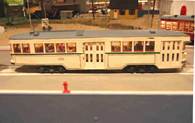 As a Custom Builder of cars I was
approached by a few modellers and historians to see if I would construct
some Detroit Peter Witts. As these cars were quite unique and, being a
Witt Fan, As a Custom Builder of cars I was
approached by a few modellers and historians to see if I would construct
some Detroit Peter Witts. As these cars were quite unique and, being a
Witt Fan, 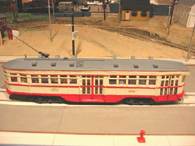 I decided to try my hand at them. Jack Schramm, a former DSR Employee and noted Author of Traction Books living in Warren Michigan wanted a model of DSR 3850 for his 80th Birthday on July 27th. 3850 was the car he chose, as it was the only one of this type constructed in the DSR Shops. DSR 3756 one of Group 9 Peter Witts purchased in 1929 from Perley A. Thomas Co. and called "The Detroiter", was one constructed for Howard Ziegel of Livonia, Michigan. I decided to try my hand at them. Jack Schramm, a former DSR Employee and noted Author of Traction Books living in Warren Michigan wanted a model of DSR 3850 for his 80th Birthday on July 27th. 3850 was the car he chose, as it was the only one of this type constructed in the DSR Shops. DSR 3756 one of Group 9 Peter Witts purchased in 1929 from Perley A. Thomas Co. and called "The Detroiter", was one constructed for Howard Ziegel of Livonia, Michigan.
Both cars are quite different in appearance.
The cars are constructed of styrene bodies (layered) with the outer skin
containing rivet detail, etc. The floors are of 1/8" bass wood, and I
use the "Ivor Walsh" method of drop out floors containing hidden wiring
with 2/56 screw mounts for contact points. 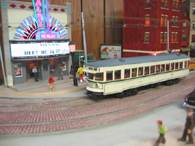 Trucks are of course "Q" Car
to suit the particular car. The interiors of the cars are completely
detailed with seats, passengers and lighting. The lighting consists of
four 14 volt 3 mm. dia. light bulbs. The head lights are LED's. All are
wired off the two interior light bars in the roof. The roof is also
constructed of formed styrene sheeting over interior formers similar to
model aircraft construction. Trucks are of course "Q" Car
to suit the particular car. The interiors of the cars are completely
detailed with seats, passengers and lighting. The lighting consists of
four 14 volt 3 mm. dia. light bulbs. The head lights are LED's. All are
wired off the two interior light bars in the roof. The roof is also
constructed of formed styrene sheeting over interior formers similar to
model aircraft construction.
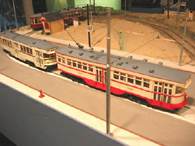 The canvas effect of the roof is done with
strips of 11/2" masking tape., as is the interior of the roof. Once
painted they look like the real thing. The cars were spray painted as
close as possible to the original cars. Pin Striping is Chart Pack Tape
or the type used for auto's, and lettering is either Dry Transfer or
Decals. A complete set of destination signs has been prepared by one of
my fellow modellers and computer geek. They are being done on matte
photo paper for insertion into the back lit sign boxes. The canvas effect of the roof is done with
strips of 11/2" masking tape., as is the interior of the roof. Once
painted they look like the real thing. The cars were spray painted as
close as possible to the original cars. Pin Striping is Chart Pack Tape
or the type used for auto's, and lettering is either Dry Transfer or
Decals. A complete set of destination signs has been prepared by one of
my fellow modellers and computer geek. They are being done on matte
photo paper for insertion into the back lit sign boxes.
Glenn Whitehouse
glenn.whitehouse@sympatico.ca
More from Glenn Whitehouse
Niagara St. Catherines & Toronto was considered to be the last truly
Interurban system to operate both passenger and freight trains in
regularly scheduled service in North America. The N S & T also operated
steamships that once plied the waters of Lake Ontario. 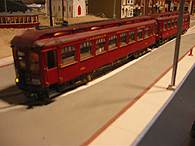 The last
passenger service was I believe 1959, while freight service continued
till 1960. After 1960 diesel power was the norm under the CNR banner.
Much of the original track network has been cut back by the CNR as
trucking became the norm. The last
passenger service was I believe 1959, while freight service continued
till 1960. After 1960 diesel power was the norm under the CNR banner.
Much of the original track network has been cut back by the CNR as
trucking became the norm.
N S & T locomotive No. 17 shown in these photos represents the type of
equipment that could be found on this once great traction system. This
locomotive was a 50 ton, 35' long by 9' wide version of a number (12)
that were constructed for the Hydro Electric Power Commission of Ontario
between 1918 and 1920. The locomotive car body was built by The National
Steel Car Company at it's Hamilton Ontario facility. Electrical and
motive power was supplied either by Westinghouse (6) or by General
Electric (6). It is not clear which Company supplied the electrical power
for No.17.
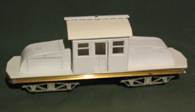
No. 17 was acquired by the N S & T in 1926 after the HEPC had finished
the Queenston Hydro Generating Project at Niagara Falls Ontario. No. 17
was in service until closure of the electric operations in 1960. The
locomotive was then sent to the Oshawa Railway ( a CNR subsidiary) where
it continued in service for another four years. Locomotive No. 17 was
scrapped in June of 1964 at the Standard Steel Company in St. Thomas
Ontario.
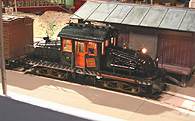
This model of No. 17 was constructed for Phil Spencer of Toronto, and in
the First Image shows its basic construction comprising a brass channel
frame and cross members with a body shell composed mostly of styrene with
some bass wood floor components. The trucks are Q Car 6' - 0" Arch Bar
Design as was the prototype. A second model of this loco is presently under construction for Bill Salton Of St. Catherines, Ontario.
The Second Image shows the locomotive at the freight shed in it's
finished stage prior to being dull coated and installing KD Couplers.
The Third Image shows the locomotive after dull coating (what a
difference) with couplers in place. The interior of the loco is lighted
as are the marker lights and head lights. 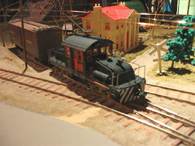 It also has details such as
controllers, engineer (2), opening doors. The entire project took about
four months to complete. It also has details such as
controllers, engineer (2), opening doors. The entire project took about
four months to complete.
The Fourth Image is of another N S & T piece of equipment that I
constructed for Bill Salton of St.Catherines, Ontario, being car No. 620,
formerly M & S C No. 620 ( Ottawa Car Co 1930 - Length 51' - 2", width 8'
- 51/2"). The model is of etched brass construction with a bass wood
floor. The brass sheet was acquired many years ago from the US (origin
unknown). 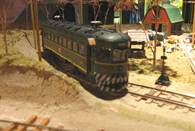 The etching was of single depth and required considerable work,
such as cutting out and recessing the doors, cleaning out the windows
etc. The model is completely detailed inside, and includes the unusual
double door system that was on this car. It was finished as per the final
version of this car which lasted till the very end of service. Trucks -
Baldwin 6'- 0" (Q Drive) and detail parts supplied by Q Car Co. The etching was of single depth and required considerable work,
such as cutting out and recessing the doors, cleaning out the windows
etc. The model is completely detailed inside, and includes the unusual
double door system that was on this car. It was finished as per the final
version of this car which lasted till the very end of service. Trucks -
Baldwin 6'- 0" (Q Drive) and detail parts supplied by Q Car Co.
The Fifth and Sixth images are of N S & T car No. 134. This car was built
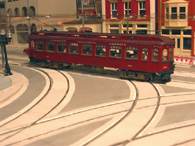 by The Preston Car and Coach Company in Preston Ontario, in 1914. It is
an unusual combine in that only one side had a baggage door. The car was
58'- 0" in length and 9"- 6" in width, and had 6"- 6" Taylor trucks. This
model along with a model of No. 135 was constructed for Bill Salton of by The Preston Car and Coach Company in Preston Ontario, in 1914. It is
an unusual combine in that only one side had a baggage door. The car was
58'- 0" in length and 9"- 6" in width, and had 6"- 6" Taylor trucks. This
model along with a model of No. 135 was constructed for Bill Salton of
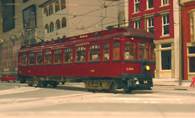 St.Catherines, Ontario. These cars are constructed with bass wood floors, a combination of styrene and card stock body parts are completely
detailed and lighted. All detail parts are from Q Car including the
Taylor Trucks. These models placed first in the Master Modellers Contest
of the East Penn Model Meet a few years ago. St.Catherines, Ontario. These cars are constructed with bass wood floors, a combination of styrene and card stock body parts are completely
detailed and lighted. All detail parts are from Q Car including the
Taylor Trucks. These models placed first in the Master Modellers Contest
of the East Penn Model Meet a few years ago.
|